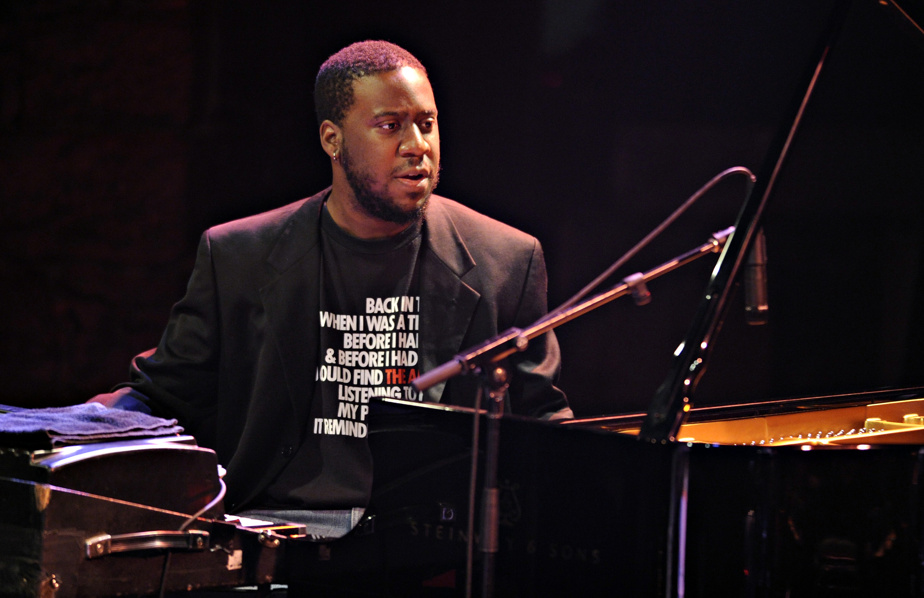A gateway to jazz for hip-hop fans, and vice versa, Robert Glasper’s work ignores borders. Conversation with one of the most brilliant masterminds in American music.
Posted at 7:00 a.m.
The tone, serious, is given from the first measures ofIn-Tune. On an elegiac piano score, the poet Amir Sulaiman invokes the ghost of George Floyd, who died under the knee of a police officer in May 2020. For Robert Glasper, no doubt: it would have been hypocritical to add a third volume – Black Radio III — to his series of the same name, not to mention the violence African Americans face, what he politely calls “the elephant in the room.”
“I know the world’s problems are already everywhere in front of us, on Instagram, Facebook and Twitter, and I know that a lot of people don’t like to feel that they are being lectured,” concedes the 44-year-old pianist, joins him at his home in California, while his daughter Lola, soon to be 2 years old, tries to enter the camera frame by throwing ” Hi playfully at the reporter.
His father draws his attention to the TV, where an animated film is playing, then resumes.
“I still feel that where I am in my career, I have an obligation, since for many people I am the gateway to several genres of music,” he says.
I’m held in high esteem in the world of jazz, hip-hop and R&B. It comes with the responsibility to speak up for all the communities I represent.
Robert Glasper
With Black Radio, Robert Glasper wrote his own little history of American music in 2012, at the heart of which rap and jazz are more than distant cousins. If his four previous albums subscribed to post-bop codes, a way for him to cement his credibility as a pure pianist, Black Radio put the richness of jazz at the service of rapped verses and soul melodies, with guests like Erykah Badu and Mos Def, on the first volume, or Q-Tip, Esperanza Spalding and Gregory Porter on its third installment, launched last February.

PHOTO BERNARD BRAULT, PRESS ARCHIVES
Robert Glasper on the Gesú stage in 2010, during the Montreal International Jazz Festival
Without Black Radioa rap album sculpted in jazz like To Pimp a Butterfly (2015), by Kendrick Lamar (in which Robert Glasper appears), would probably not have been possible.
“When I won my first Grammy in 2013 [pour Best R&B Album ; il en a décroché un quatrième en 2021], there are plenty of people who said to me: ‟This is a victory for all of us!” Before, to be recognized in these categories, you had to play a very formatted style of R&B. Black Radio gave permission for bands like Snarky Puppy, Hiatus Kaiyote or The Internet to be recognized at the Grammys, while remaining true to themselves. »
The real superheroes
Surprisingly, it was not until the late 1990s, when he left his native Houston to study in New York, that Robert Glasper immersed himself in hip-hop culture, thanks to a friend, the singer Bilal, as well as one of the headliners of this 42e edition of the International Jazz Festival, The Roots.
At the time, Glasper and Bilal regularly took an hour and a half bus to Philadelphia in order to attend the legendary jam sessions chaired by the group at the Black Lily, epicenter of the neo-soul movement. « Questlove [de The Roots] is still the best hip-hop drummer in the world”, thinks the one who has often joined the formation on stage.
What he does [Questlove] looks simple, but it’s super thoughtful. His game is not filled with big passes, but asks any batsman to reproduce his beats and it’s not going to happen.
Robert Glasper
The work of The Roots and that of Robert Glasper both find their vein at the confluence of the festive, the spiritual and the political. Bright example: Black Superherohighlight of Black Radio IIIwhich the pianist recorded with, in mind, the “dinner lady” of his elementary school, the one who allowed his mother to use his civic address so that young Robert could continue to attend the best establishment in Houston, not the one his new neighborhood intended him to be.
“Too often, we don’t recognize superheroes, even when we see them, because they don’t wear a cape or because they aren’t human. But it’s because I graduated from this school that I was then able to go to other great schools. It was this woman who caused this domino effect. It is thanks to her that we speak to each other today. »
This lady deserves her Grammy too.
July 6, at 8 p.m., at Théâtre Maisonneuve, Place des Arts
Montreal International Jazz Festival | Robert Glasper’s sense of responsibility

